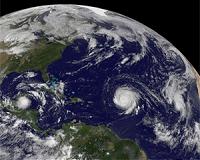| . |  |
. |
Miami (AFP) Nov 24, 2010 The 2010 Atlantic storm season was twice as active as normal but what really amazed forecasters was that a record 12 hurricanes formed but never made landfall in the United States. The hurricanes and 19 named tropical storms over the Americas and the Caribbean during the June 1-November 30 season did contribute to some of the worst flooding in decades in Central and Southern America. Quake-hit Haiti was spared a direct hit, although Hurricane Tomas, which killed 14 people as it ravaged towns in the tourist island of Saint Lucia, still claimed at least 20 lives and aided the spread of deadly cholera. The season is among the five most active on record, said experts Philip Klotzbach and William Gray of Colorado State University. A normal season sees an average of 11 tropical storms and six hurricanes -- six of them major storms reaching category 3 or higher on the five-point Saffir-Simpson scale. Klotzbach and Gray attributed the high activity to "the combination of anomalously warm Atlantic basin sea surface temperatures and a rapidly developing La Nina event," which sees cooler sea surface temperatures. "These favorable cyclone-enhancing conditions led to favorable dynamic and thermodynamic conditions for storm formation and intensification," they added. The hurricane season was disastrous in Central America, which saw its worst rainy season in half a century as floods and landslides killed more than 300 people, with most victims in Honduras, Guatemala and El Salvador. Many more were left homeless and storms caused billions of dollars in damage, although many hurricanes had weakened to tropical storm status by the time they made landfall. The activity was 198 percent more than the 1950-2000 average for named storms, 203 percent more for hurricanes and 217 percent more for major hurricanes, according to the experts. Hurricane Alex, the first of the season in late June, prompted a five-day shutdown in clean-up efforts of the massive BP oil spill in the Gulf of Mexico, the biggest in US history. Beaches, shorelines and marshes lay smeared with thick patches of oil in its wake. Alex also killed 22 people in northeastern Mexico, destroyed over 40,000 homes and caused an estimated two billion dollars worth of damage. The United States lucked out this time, with no major direct impact. Many storms formed over the North Atlantic, passing over or near Bermuda but causing no casualties and petering out in the ocean without making landfall. Hurricane Earl, which at one point reached category four strength with winds of 136 miles (220 kilometers) per hour, was the most powerful hurricane to threaten the US Northeast and New England since 1991. But the storm never made landfall, instead lashing the northeastern US seaboard with heavy rains and strong winds, disrupting holiday plans for millions. Yet it moved in parallel with the coast, only making landfall in the eastern Canadian province of Noca Scotia and weakening dramatically with limited damage.
Share This Article With Planet Earth
Related Links Bringing Order To A World Of Disasters When the Earth Quakes A world of storm and tempest
 Threshold Temp For Hurricanes And Tropical Thunderstorms Is Rising
Threshold Temp For Hurricanes And Tropical Thunderstorms Is RisingManoa HI (SPX) Nov 09, 2010 Scientists have long known that atmospheric convection in the form of hurricanes and tropical ocean thunderstorms tends to occur when sea surface temperature rises above a threshold. The critical question is, how do rising ocean temperatures with global warming affect this threshold? If the threshold does not rise, it could mean more frequent hurricanes. According to a new study by researc ... read more |
|
| The content herein, unless otherwise known to be public domain, are Copyright 1995-2010 - SpaceDaily. AFP and UPI Wire Stories are copyright Agence France-Presse and United Press International. ESA Portal Reports are copyright European Space Agency. All NASA sourced material is public domain. Additional copyrights may apply in whole or part to other bona fide parties. Advertising does not imply endorsement,agreement or approval of any opinions, statements or information provided by SpaceDaily on any Web page published or hosted by SpaceDaily. Privacy Statement |